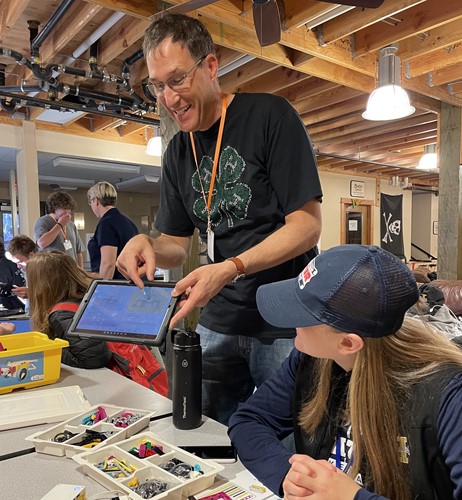Grant to help UI Extension promote ag science skills, careers
By John O’Connell
University of Idaho
 University of Idaho Extension 4-H Youth Development has received a grant to teach children about agricultural science and technology and introduce them to career opportunities in the field.
University of Idaho Extension 4-H Youth Development has received a grant to teach children about agricultural science and technology and introduce them to career opportunities in the field.
The U.S. Department of Agriculture’s National Institute of Food and Agriculture (NIFA) awarded $750,000 toward the three-year project, which aims to reach 2,000 to 4,000 youth per year during out-of-school time through 4-H clubs, camps, after-school activities and special programs.
Matt Fisher, a UI Extension area educator specializing in agriculture and STEM (science, technology, engineering and mathematics), and Mike Knutz, area 4-H youth development educator, are co-principal investigators of the project, which they’ve titled Agriscience Technology Pathways (ATP).
U of I’s College of Agricultural and Life Sciences (CALS) secured two of USDA’s 11 NIFA Food and Agricultural Nonformal Education grants.
The other CALS grant will fund a program submitted by Jae Ryu, an associate professor in the Department of Soil and Water Systems, empowering youth to design, build and fly drones during a workshop hosted in conjunction with the Idaho 4-H State Teen Association Convention.
Ryu also received about $750,000 covering three years for his program.
ATP will be offered statewide and will encompass several facets. Fisher is developing learning kits to teach youth facts and science lessons about Idaho’s major commodities – such as potatoes, dairy and sugar beets – working closely with grower-funded commodity groups.
The kits will be loaned to 4-H clubs, groups and camps in every region and will include lessons and hands-on activities, such as making a potato-powered clock or churning milk into butter.
Funding will also help overcome barriers to youth participation in 4-H programs where agricultural STEM curriculum is offered. For example, 4-H clubs or groups may receive funds to help cover busing, as well as youth scholarships to help cover day camp or convention registration costs.
Fisher and Knutz hope the funds will serve as a “carrot,” enticing 4-H event organizers to add agricultural STEM curriculum to their itineraries to be eligible for the assistance.
In addition to the learning kits, Ryu’s iDrone 4-H program and an agricultural robotics program Fisher helped develop are available to program organizers interested in incorporating agricultural STEM curriculum.
“We’ve attended 4-H coordinator meetings and talked about opportunities for transportation and scholarships and curriculum kits,” Knutz said. “We’re hoping to reach youth who may not currently be served by 4-H.”
Fisher and Knutz will be partnering with AmeriCorps, providing training to the federally supported program’s volunteers, enabling them to deliver agricultural STEM curriculum wherever they’re placed in Idaho.
They plan to facilitate field trips to U of I Research and Extension Centers providing 4-H youth the opportunity to interact with Extension researchers and witness some of the many career options in agricultural science.
For example, their budget includes a biotechnology day camp to be hosted at the Aquaculture Research Institute at the U of I’s Hagerman Fish Culture Experiment Station.
Jacob Bledsoe, an Extension specialist and assistant professor of aquaculture research, will lead hands-on experiments involving biotechnology and molecular biology.
“He sees in his own field it’s hard to find graduate students,” Knutz said. “He was very happy to be part of this program to help spark an interest for students to enter agricultural science careers.”
They’ve also arranged for tours of the Buhl commercial trout farm Riverence in conjunction with the biotechnology day camp.
They’ve been in discussions with many other Magic Valley food processors and large agricultural businesses about hosting tours as part of the grant, aimed at raising awareness about jobs in the agricultural sciences.
“We have lots of different companies that are agriculturally based,” Fisher said. “In talking with some of these companies they have a vested interest in keeping employees, and they would prefer to have employees from the area who are familiar with their companies.”
Still can't find what you are looking for? Find by topic:
- Achievement Award (YF&R)
- Actions Alerts
- Advocacy
- Ag Ambassadors
- American Farm Bureau
- American Farm Bureau Policy Book
- Archive Photos
- Articles
- Board of Directors
- Calendar - State/District
- Calendar - County
- Capitol Reflections
- Collegiate Chapters
- Committee Application Form
- Commodities
- Convention Annual
- County Presidents & Board Information
- County Resource Page
- Delegate Form
- Discount Programs
- Discussion Meet
- Discussion Meet - High School
- Education Programs
- Events
- Excellence Award (YF&R)
- Expense Voucher
- Flickr
- Gem State Producer
- High School Discussion Meet
- High School Speech Contest
- Hope in Idaho Ag
- House of Delegates Credentials Form
- IFBF Board of Directors
- IFBF Policy Book
- IFBF Staff
- Insurance
- Legislative Action Program
- Legislative Issues
- Library
- MAC Trailer
- Magazines
- Map My Benefits
- Member Benefits
- Member Discount
- Membership Application
- Mission Statement
- Moving Agriculture to the Classroom
- Newsletter Sign up
- News Releases
- News Room
- Open Range Law
